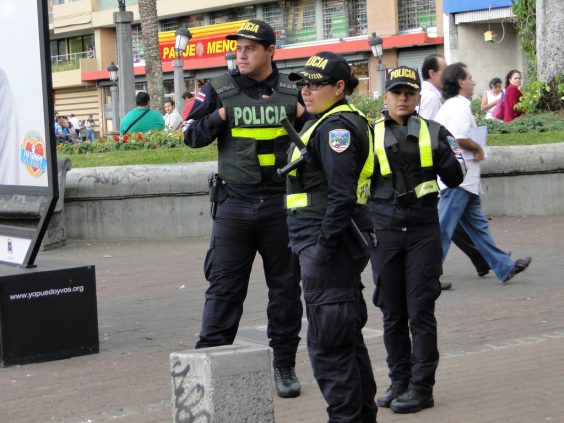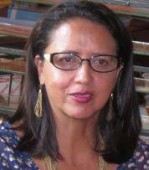The Re-election of Juan Orlando Hernández and a New Penal Code in Honduras
by Dina Meza translated by Katherine Wingfield-Dobbs / December 9, 2016 / No comments

Honduran police. The proposed penal code would criminalize social protest. Image via Flickr user: Paulien Osse.
Despite international objections, the Honduran National Congress is taking steps to approving its new Penal Code, which contains several articles criminalizing social protest.
In a country like Honduras, where there is institutional delegitimization as stated by the Inter-American Commission on Human Rights (IACHR) during their visit to the country almost two months after the 2009 coup, the combination of a re-electionist plan by the current president of the Republic, Juan Orlando Hernández, and the almost immediate legislative initiative of the head of Parliament, Mauricio Oliva from the same party as the leader, to create a new Penal Code – which contains as a fundamental part the criminalization of social protest – is worrying.

- Honduras has one of the world’s highest murder rates. It is also one of the most dangerous countries to practice journalism, ranking 129th out of 180 in the 2014 World Press Freedom Index. Journalists are regularly threatened, attacked, and killed for their work. The Honduran government fails to punish those who use violence against reporters, essentially granting them impunity. This space will be dedicated to examining the lack of protection for Honduran journalists exercising their profession. Topics will include the use of state-sponsored advertising as a mechanism to reward or punish publications, and censorship and self-censorship as hindrances to democratic progress.

- Born in Cofradía, Honduras, Dina Meza has been recognized by PEN International, Amnesty International, Index on Censorship and Reporters without Borders for her work as a journalist and human rights advocate. Currently, Dina is the driving force behind the creation of Honduras PEN Centre. In 2013, she wrote “Reign of Terror,” an in-depth report on threats to Honduran journalists for Index on Censorship’s magazine. In 2014, she was named one of Reporters Without Borders’ “100 Heroes and Heroines of Information.”
It is suspected that there were several events which were possibly concatenated: in April of 2016, the Supreme Court of Justice ruled in favor of presidential re-election, which is prohibited by the Constitution of the Republic; in August of that year, the proposal for a law to amend the Penal Code was presented; on November 7, 2016, the US Embassy in Honduras indicated in a statement that it “was not opposed to President Hernández or other presidents running for re-election; and on November 9, Hernández announced that he was accepting the candidature for re-election.
Added to this the election of a Supreme Court of Justice in agreement with the wishes of Hernández and certain sectors, what they needed was a Judiciary submissive in order to meet their objectives and those of those in political and economic prominence who have made Honduras their Persian market.
At present, National Congress is taking giant steps forward in approving the new Penal Code, without allowing the participation of its citizens against which it includes several articles that criminalize social protest; it designates offenses such as disobedience, conspiracy, disruption of order, public disorder, amongst others, with the intention of stopping any attempt to protest against unlawful acts by those in power.
Social control is the goal of those who are interested in the adoption of this new legislation, which undermines human rights, according to statements by a number of civil society organizations, who have denounced the obstruction of their participation in the discussions on this important legislation. Women and the LGBTI community feel that attacks against them through legal entities will only deepen their current situation of violence.
What is also worrying is that the Spanish Agency for International Development Cooperation is very interested in the approval of the new Code as presented, despite international experts questioning its content, which undermines, amongst other things, the right to freedom of expression. It strongly approves such barbarity against Honduran society – perhaps it is the return of the mirrors of the Conquest.
What is the motivation for the Spanish Agency for International Development Cooperation agreeing the new Penal Code without restrictions? According to assessments by civil society organizations, it is playing a lamentable role because this legislation goes against international standards for human rights.
The Honduran Office of the United Nations High Commissioner for Human Rights has warned of a series of irregularities and made recommendations to National Congress. This State Power has ignored them all.
Amongst the issues that this international institution has raised are: “To review in a comprehensive manner and from a perspective of exceptionality the paragraph on crimes against public order, with the aim of ensuring its compatibility with the exercising of transcendental human rights in a democratic society, such as the right to freedom of peaceful gathering and association. The review includes examining restrictively the crime of terrorism in order to conform to the standards and guidelines consistently promoted by the United Nations.”
Likewise, the State of Honduras undertook to decriminalize libel and slander, but it has not done so. The High Commissioner’s Office has recommended that it is appropriate to “decriminalize the crimes of libel and slander, as being a criminal sanction incompatible with the right to freedom of expression.”
Then the coincidence of the role of re-election with the approach to criminalize social protest is symptomatic of what will be triggered during the electoral process in 2017, when the political climate is going to get very hot and, if combined with the intolerance of President Juan Orlando Hernández towards the defense of human rights, things will be red hot.
Against this backdrop, it is important that Honduran society does not allow the approval of legislation which entails generating criminal roles dedicated to those who are not in agreement with the re-election of the current ruler, or illegal actions that other officials may commit.
The streets again expect to be filled with bare feet, voices hungry for justice, and civic actions that manage to stop the monster of lawlessness in power.




